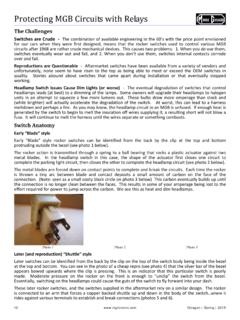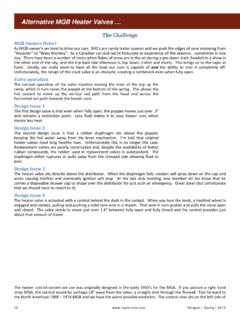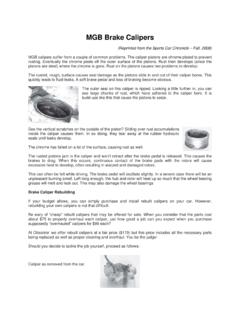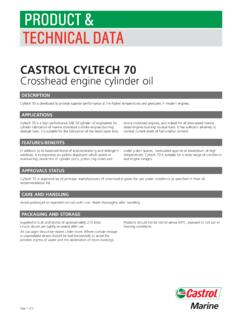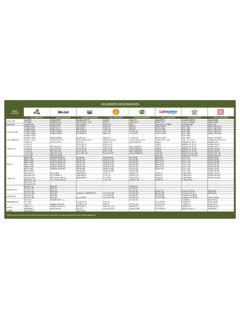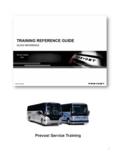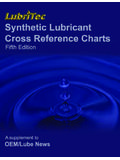Transcription of Problems with Modern Oils! - Toronto MG Car Club
1 Problems with Modern oils ! OIL IS KILLING OUR CARS!!!! PART 1 By Keith Ansell (Keith Ansell is the owner and proprietor of Foreign Parts Positively. He started his career in 1962 as an apprentice mechanic in a nationally known shop. After completing his apprenticeship, he worked for British Motor Car Distributors as a line mechanic. Foreign Parts Positively (also known as FPP) started business in the fall of 1969 at Aloha, Oregon. Foreign Parts Positively has been doing business since that time and built the present facility in 2001. Keith has trained and is experienced on most British cars from 1936 to 1980. He has raced MGA twin-cam, MGA MKII Deluxe, Sprite, and Lotus 18 cars. He has also built many successful SCCA race cars from H Production 948 AH Sprites to MGBs. Keith is a member of NAMGAR, NAMGBR, the Columbia Gorge MGA Club, and the Willamette MG Club.)
2 About a year ago I read about the reduction of zinc dialykl dithiophosphate (ZDDP) in the oils supplied with API approval that could affect sliding and high pressure (EP) friction in our cars. The reduction of these chemicals in supplied oil was based on the fact that zinc, manganese and/or phosphates reduce the effectiveness and eventually damage catalytic converters and introduce minute amounts of pollutants into our atmosphere. A month or so ago I had a member of the Columbia Gorge MG Club bring a totally failed camshaft and lifters back to me that had only 900 miles on them!! I immediately contacted the camshaft re-grinder and asked how this could happen. They were well aware of this problem as they were starting to have many failures of this type. In the past, the lack of a molybdenum disulfide camshaft assembly lubricant, at assembly, was about the only thing that could create this type of problem . My customer has assembled many engines and had lubricated the camshaft properly.
3 This got me on the phone to Delta Camshaft, one of our major suppliers. Then the bad news came out: It's today's " Modern " API (American Petroleum Industry) approved oils that are killing our engines. Meaning all flat tappet (cam follower) equipped engines as used in MG, Triumph, Austin, all BMC products, all British Leyland products, American hi-performance engines and many others. Next call: To a major camshaft supplier, both stock and performance (Crane). They now have an additive for whatever oil you are using during break-in so that the camshaft and lifters won't fail in an unreasonably short period of time. They also suggest using a diesel rated oil on flat tappet engines. Next call: To a racing oil manufacturer that we use for the race cars (Redline). Their response: "We are well aware of the problem and we still use the correct amounts of those additives in our products". They continued to tell me they are not producing API approved oils so they don't have to test and comply.
4 Their oils were NOT the "new, improved and approved" ones that destroy flat tappet engines! "We just build the best lubricants possible". Sounds stupid, doesn't it, New-Approved but inferior products, but it seems to be true for our cars. To top this off: Our representative from a major supplier of performance and street engine parts (EPWI) stopped by to "warn us" of the problem of the NEW oils on flat tappet engines. This was a call that the representative was making only because of this problem to warn their engine builders! "The reduction of the zinc, manganese and phosphates are causing very early destruction of cams and followers . They are recommending that, for now at least. there must be a proper oil additive put in the first oil used on new engines, beyond the liberal use of molydisulfide assembly lube. They have been told that the first oil is the time the additives are needed but remain skeptical that the first change is all that is needed by their statement: Use diesel rated oils such as Delo or Rotella that are usually available at auto stores and gas stations.
5 This problem is BIG! American Engine Rebuilder's Association (AERA) Bulletin #TB2333 directly addresses this problem . I had a short discussion with their engineer and he agreed with all that I had been finding. Next phone call was to a retired engineer from Clevite, a major bearing and component manufacturer. First surprise was that he restored older British Motor bikes. The second surprise was that he was "VERY-aware of this problem because many of the old bikes had rectangular tappets that couldn't rotate and are having a very large problem with the new oils . He has written an article for the British Bike community that verify all the "bad news" we have been finding. Comp Cams put out "#225 Tech Bulletin: Flat Tappet Camshafts". They have both an assembly lube and an oil additive. The telling sentence in the bulletin was "While this additive was originally developed specifically for break-in protection, subsequent testing has proven the durability benefits of its long term use.
6 This special blend of additives promotes proper break-in and protects against premature cam and lifter failure by replacing some of the beneficial ingredients that the oil companies have been required to remove from their off-shelf oil". Next question: Now what do we do? From the camshaft re-grinders (DeltaCam) "Use oils rated for diesel use". Delo (Standard Oil product) was named. About the same price as other quality petroleum based oils . They are not API formulated and have the zinc dithiophosphate we need in weights we are familiar with . From the camshaft manufacturer (Crane): "use our additive " for the first 500 miles. From General Motors (Chevrolet): add EOS, their oil fortifier, to your oil, it's only about $ for each oil change for an 8 ounce can (This problem seems to be something GM has known about for some time!) The additive says for break-in only, some dealers add it to every oil change. From Redline Oil: Use our street formulated synthetics.
7 They have what we need! From Castro!: We are beginning to see a pattern emerging on older cars. It may he advantageous to use a non-approved lubricant, such as oils that are Diesel rated, 4 Cycle Motorcycle oils and other specified diesel oils . Last question: So what are we at Foreign Parts Positively going to do? After much research we are switching to Redline Street rated oils and stocking the Castrol Products that are diesel rated or otherwise seem acceptable. This is a difficult decision as we have been a dealer and great believer in all Castro! products for over 40 years. We have been using Castro! Syntech oil in new engines for about 3 years so the cost difference is minimal on new engines. The actual cost in operation is also less as the additive package in Redline makes a 1-year or up to 18,000 mile change recommended! Yes, it is a long change interval but with lowered sulfur levels and the elimination of lead and many other chemicals in the fuels there are less contaminants in our oil from the fuel which is the major contributor to oil degradation.
8 We will continue to offer the Castro! products but will now only stock the suggested diesel oils that they produce. Too many things are starting to show up on this subject and it has cost us money and time. Be aware that "New and Improved'", or even products we have been using for many years. destroys our cars as it isn't the same stuff we were getting even a year ago. If you have any additional input let us know. We need to let every flat tappet engine owner. : every British Car owner know that things are changing and we MUST meet the challenge. Keith Ansell -President Foreign Parts Positively Inc. OIL IS KILLING OUR CARS!!!! PART Last month s report on this subject is turning out to be just the tip of the iceberg! Many publications have had this subject of zinc-dialkyl-dithiophosphate (ZDDP) covered in varying depths over the last few months. Some publications have even had conflicting stories when you compare one month s article with their next month s article!
9 They are all ending up supporting our report. I have had the good fortune to have the ear of quite a few leaders in the industry including some wonderful input from Castrol. We have been very reluctant to dump Castrol, as it has been such a great supporter of our cars and industry over the years. Castrol hasn t really abandoned our cars, just shifted to a more mass marketing mode. Many Castrol products are not appropriate for our cars today, some still are; Now for the latest report: (1) Castrol GTX 20W-50 is still good for our cars after break-in! 10W-40, 10W-30 and other grades are NOT good. Absolutely NOT GOOD is any oil (Any Brand) that is marked Energy Conserving in the API Donut on the bottle, these oils are so low with ZDDP or other additives that they will destroy our cams. Virtually all Diesel rated oils are acceptable. (2) Castrol HD 30 is a very good oil for break-in of new motors.
10 This oil has one of the largest concentrations of ZDDP and Moly to conserve our cams and tappets. (3) Only an unusual Castrol Syntec 20W-50 approaches the levels of protection we need when we look at the better synthetic lubricants. We are attempting to get this oil but will be using Redline 10W-40 or 10W-30 as these are lighter weights for better performance, flow volume, less drag and have the additive package we need. (4) The trend today is to lighter weight oils to decrease drag, which increases mileage. Most of these seem to be the energy Conservation oils that we cannot use. (5) Redline oil and others are suggesting a 3,000 mile break-in for new engines! Proper seating of rings, with today s lubricants is taking that long to properly seal. Shifting to synthetics before that time will just burn a lot of oil and not run as well as hoped. (6) The Energy Conservation trend was first tried by automakers to increase mileage numbers and secondly because the ZDDP and other chemicals degrade the catalytic converter after extended miles, increasing pollution.
